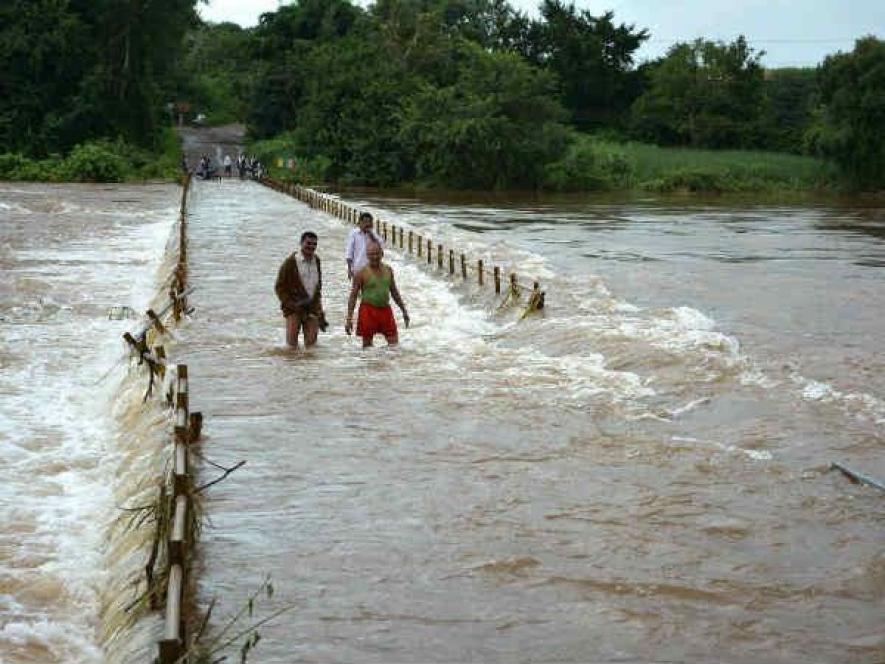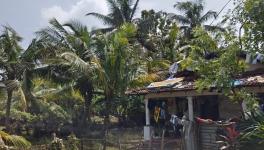Koshi Floods: Stakeholders Call for More Research, Trans-Boundary Cooperation to Avoid Further Disasters

Image Courtesy: Oneindia
Patna: The floods caused by the river Koshi year on year affects millions in India, Nepal and Bangladesh, leaving behind long-lasting impacts which affect sustainable development. Experts say that there is a need for more trans-boundary collaboration to tackle multiple risks brought about by flooding.
At the Koshi Disaster Risk Reduction Knowledge Hub (KDKH) annual dialogue in Kathmandu this year, experts called for more basin-scale research and trans-boundary collaboration to tackle the problems people faced. They said that the inhabitants of the disaster-prone trans-boundary basin live with lesser than necessary information, including knowledge of the risks they face. Climate models predict that the Koshi basin will witness “overall warmer temperatures” in the years to come. This is likely to have an impact on snow and glacial reserves, leading to an increased risk of glacial lake outburst floods (GLOFs). A recent report by the Kathmandu-based International Centre for Integrated Mountain Development (ICIMOD) and the United Nations Development Programme (UNDP)identified 42 potentially dangerous lakes in the Koshi basin.
Koshi is known as the ‘sorrow of Bihar’ for devastating floods that cause heavy damage annually. It is a river of unstable nature and shifts its course frequently. The river, which flowed near Purnia earlier, now flows west of Saharsa; the distance between the two is close to hundred kilometeres. Its uncertain nature has been attributed to the heavy silt carried during the monsoon season. The eastern Koshi embankment was breached in 2008, flooding five districts in northern Bihar and affecting millions of people. Koshi continued to create havoc in large areas of the state during the monsoon season this year. It travels 205 kms in Bihar to join the Ganges near Kursela in Katihar district.
“The hub’s role in convening leading minds and agencies working on disaster risk reduction and development in the basin is a much needed impetus towards regional collaboration. Its involvement with national level agencies shows just this – the need for science-based decision making, looking beyond state boundaries,” said Pema Gyamtsho, Director General, ICIMOD.
More than 100 participants from different government organisations, research institutes and development agencies met at the KDKH Annual Dialogue to ponder over a vision for a collaborative effort and on a governance structure for the KDKH. The transboundary working groups (TWGs) discussed recent research findings, good practices, and specific areas for trans-boundary collaboration to reduce disaster risks.
They have urged government agencies to support the development of its country chapters to enable trans-boundary collaboration.Pushpa Raj Kadel, Vice-Chairman of the National Planning Commission, Nepal, said: “Reducing these disaster risks in the basin is not possible without cooperation across administrative boundaries and with upstream and downstream countries. We need strong collaboration between different stakeholders to move the needle from disaster response to disaster risk reduction in the basin.”
Kiran Rupakhetee, Division Chief /Joint Secretary, National Planning Commission, Nepal, added that the draft strategy and guidelines could provide a sound base for further discussions at the national and provincial levels to establish its country chapters.
Yang Yongping, Professor at the Chinese Academy of Sciences, shared that a regional mechanism is needed for monitoring of glacial lakes and floods while integrating research on downstream impact. Rijan Kayastha, Professor at Kathmandu University, noted how standardised guidelines for management and mitigation of glacial lake outburst floods (GLOFs) were still not in place in Nepal. The TWG on GLOFs, alongside experts, is prioritising the development of such guidelines that can be applicable for the region.
“The ongoing cross border community-based flood early warning system from Nepal and India demonstrates the benefits of transboundary collaboration,” said Vyas, Vice Chairman, Bihar State Disaster Management Authority (BSDMA). He added that BSDMA would support discussion with central government agencies to develop the KDKH country chapters. Krishna S. Vatsa, Member, National Disaster Management Authority, said that although there were bilateral government mechanisms in place, the KDKH added greater value by bringing basin-level research and the needs of communities to the forefront. He also supported further country-level dialogues to establish country chapters.
The TWG on landslides shared recent approaches to monitor landslides and sedimentation in the basin, including the successful community-based landslide early warning system and sediment management practices. The group noted the high cost of non-cooperation in the Koshi basin given the high sediment flux and the scale of infrastructure development in the basin. The TWG on Floods emphasised on trans-boundary collaboration and integrating technology for flood-risk management in close collaboration with vulnerable communities.
The TWG on Community Based Disaster Risk Management shared practices which could be replicated such as citizen science to support local communities, citizen-based flood forecasting/information system, index-based flood insurance, and cross-border community-based flood early warning system and innovation in WASH. Aditya Bastola, Gender Specialist, ICIMOD, stressed on the need to manage these disasters while ensuring gender and social equity.
Recent findings from the TWG on drought were also shared. Incidences of drought within the basin are increasing, noticeably after the year 2000. The annual demand for water within the basin is around 26 billion m3 and rising. However, there are uncertainties in the forecast and future projections of drought. Participants highlighted the need to transfer knowledge products to local farmers and capacity building for effective drought management and mitigation.
Anil Pokhrel, Chief Executive at National Disaster Risk Reduction and Management Authority, Nepal, said: “Many communities in the mid-hills of Nepal are being forced to leave their homes because of the lack of water. This raises important issues of equitable water access, well-being, and livelihoods. Through the KDKH, we could build a roadmap for both transboundary collaboration and contribute to these multidisciplinary issues.”
“Greater inter-governmental collaboration is needed to address problems which are transboundary in nature. Achieving the targets of the Sendai Framework for DRR, the 2030 Agenda of Sustainable Development, and the Paris Agreement is only possible with meaningful engagement of multilateral agencies, government at all levels – international to local – academia/research institutions, and local communities,” said Ayshanie Medagangoda Labe, Resident Representative of United Nations Development Programme.
The organizers of the KDKH Annual Dialogue – ICIMOD; Caritas India; DP-Net; IDMR-Sichuan University; Indian Institute of Technology, Kanpur; Institute of Mountain Hazards and Environment; International Water Management Institute; Lutheran World Relief; Patna University; UNICEF Nepal; UNDP Nepal; and Yuganter – agreed to continue to work together with KDKH members and government agencies to establish and strengthen the country chapters and trans-boundary working groups.
An official release of the ICIMOD earlier this year said the south-Asian floods of 2020 were a humanitarian crisis with millions across the subcontinent being impacted. Already reeling from the COVID-19 pandemic, some 9.6 million people in India, Bangladesh, and Nepal were displaced or adversely affected by the monsoon floods. In the trans-boundary Koshi River basin, spread across China, India, and Nepal, the situation was equally grim this year, with a number of landslides and an alert issued on a potential glacial lake outburst risk from China to Nepal. Many of these disasters have major cascading impacts on downstream communities, affecting sustainable development in the basin.
The KDKH was conceptualised in 2018 to develop a common understanding and to address trans-boundary disasters like the floods this year during the monsoon season. The hub aims to create a smooth mechanism for scientific and people-centered research to feed into inclusive policy and decision-making that takes the basin approach to reduce disaster risks and for building resilience.
Get the latest reports & analysis with people's perspective on Protests, movements & deep analytical videos, discussions of the current affairs in your Telegram app. Subscribe to NewsClick's Telegram channel & get Real-Time updates on stories, as they get published on our website.
























